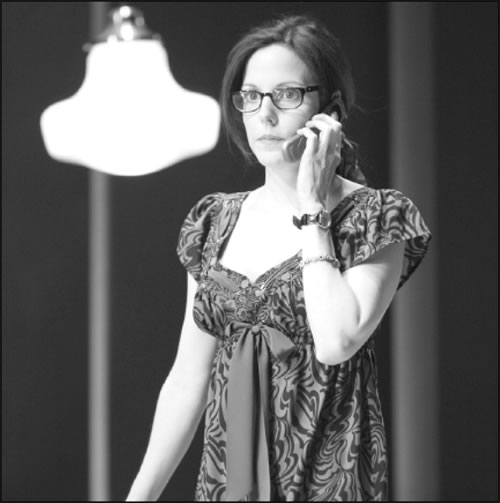By Jerry Tallmer
Gordon’s gone, but his phone keeps ringing
With echoes of flower children through the decades, the saddest line in Sarah Ruhl’s new play is “Where have all the phone booths gone?”
It is spoken—or in any event thought—by Gordon, the soon-to-be-dead man of “Dead Man’s Cell Phone,” just before the heart attack that will kill him as he sits awaiting his lobster bisque in an all-but-empty sidewalk café.
When, moments later, his cell phone starts ringing—and ringing and ringing—the only other person in sight, a self-effacing young woman named Jean, sipping coffee at another table, upon realizing he is dead, takes it upon herself to answer the persistent cell phone.
And that opens up a whole new set of avenues in her life and—through Anne Bogart’s staging at Playwrights Horizons—in ours.
Director Bogart sees this play as “one woman’s journey of self-discovery through the grace of other people”—the woman being the Candide-like Jean (Mary-Louise Parker), the other people being Gordon’s grieving mother, Mrs. Gottlieb (Kathleen Chalfant), Gordon’s overlooked brother (David Aaron Baker), and of course Gordon himself (T. Ryder Smith).
“It’s really a play about love, and it’s really very funny, though that’s not always clear when you read it,” say Ms. Chalfant, whose Mrs. Gottlieb is given to saying things like: “Could someone please turn their fucking cell phone off” during a High Mass for Gordon (though Mrs. Gottlieb is probably more agnostic than either Catholic or Jewish).
Through the ringing cell phone (Gordon’s) Jean meets other people in Gordon’s past—his wife, his mistress—and we ourselves learn from Gordon himself about his lucrative profession of sorts, importing body parts from places like China and reselling them at enormous profits.
Funny as hell, yes? Well, yes. Because with it all, playwright Sarah Ruhl, as we learned from her “The Clean House” a few seasons ago, has a poet’s eye, a poet’s compression, a poet’s sensibility.
Ms. Chalfant also sees a Shavian element at work here—“the undeserving poor,” the undeserving one being Gordon, “not needy of anyone’s love.” There are also undeniable touches of Ionesco, particularly in a dining-room scene during which Jean apologizes for the loudness of her hiccups and Mrs. Gottlieb says: “Yes, they are, aren’t they? Remarkably loud hiccups for such a small woman.”
“What a challenge to direct!” says Anne Bogart. “Which is what Sarah does, gives challenges to everybody. She doesn’t make it easier for you.”
Other manifest influences are the lonely paintings of Edward Hopper and—at least to me—intimations of the great movies of Jean Vigo and Jean Cocteau.
Gordon’s cell phone finally gives out, and it is only then that his mother realizes he is really dead. “She knew it before,” says the actress—the brilliant actress—who plays her, “but not until there was no voice on the phone did she feel he was dead.”
Greenwich Villager Chalfant who can do no wrong on stage—as anyone who saw “Nine Armenians” or “Angels in America” or “Wit” can testify—is also busy Monday nights through April playing Virginia Woolf to Patricia Elliottt’s Vita Sackville-West in “Vita & Virginia” at the Zipper Theater on West 37th Street.
So, Kathleen, do you yourself have a cell phone?
“Me? I do. I’ve even gone so far as to have a Blackberry. When I went to Radio Shack six months ago to get a cell phone, the kids just laughed at me. So now I have a Blackberry.”
And you, Ms. Bogart?
“Me? I always go for the newest technology when it’s most expensive. So I actually have an iPhone. I’m talking to you on it now. It makes life easier in some ways, and in some ways not.”
Just like the plays of Sarah Ruhl.
Dead Man’s Cell Phone. By Sarah Ruhl. Directed by Anne Bogart. Through March 29 at Playwrights Horizons, 416 West 42nd Street, (212) 279-4200.



































